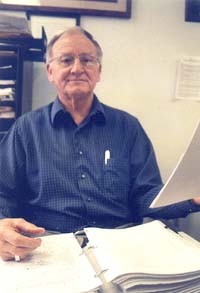| Courtesy of the Las Vegas MERCURY
By Larry Wills Tuesday, November 18, 2003 On Eldon Hardy's office wall is a list of rules for kindergarten kids on how to behave: Be nice to each other. Don't hit people. Put things back where they belong. Hold hands when you go outside. Hardy, as the state's ombudsman for homeowners'
associations, wishes more people would follow those rules. If so, his job
would be much easier. But they obviously don't. Hardy's office has grown
from three people in 2001 to an authorized 11 staffers this year, with
a caseload that's approaching 300. It seems to be the fastest-growing office
in state government.
"Several people have died from stress," Hardy says. "One lady was so frustrated, she had a stroke" amid a dispute over home repairs. Hardy's attitude has clearly changed since he took office nearly three years ago. Experienced in resolving disputes all his professional life, at the time he was more sanguine that people would listen to reason. Today, he's not as optimistic. "According to a survey last year, 90 percent of the people were pleased with their associations," he says. "But most of them don't know what's going on." He listed some of the more egregious violations, such as secret meetings, spending reserve funds and a mob of homeowners who didn't know what they were getting into when they moved into an association. One home buyer was assured he could widen his driveway for an RV, only to find out he was breaking association rules. He had to remove it. Another family had too many cars for their garage, then discovered they couldn't park on the street. They sold the house. Fortunately for Hardy, help is on the way. This year's Legislature authorized a five-member commission, to be appointed this month, that will get tough on violators. The additional staff will include an investigator and field officers to tell board members what they can and cannot do. "The new commission will have the authority to order the boards to comply," he says. That authority includes issuing cease-and-desist orders and fining board members for violations of the law. The board member can use association money to pay the fine unless the violation is intentional. Then he'll have to pay from his own pocket. That authority also will extend to developers' sales staffs. Many of the laws are already on the books--financial disclosure, open meetings and publishing agendas--but enforcement has been inadequate. Hardy hasn't waited to initiate probes when he could, such as an ongoing investigation of secret board meetings at Sun City Summerlin. That community is in an uproar over sagging golf revenues and other issues that cost the executive director his job. One of Hardy's headaches is that older associations have failed to register with his office, raising questions about just how many such communities there are in Southern Nevada. He's working with the secretary of state's office to force them to sign up and pay their dues. The ombudsman's office is entirely funded by the associations. Another problem is that home buyers aren't getting the word. Hardy says some homeowners have waited for months to get a copy of the community rules, in violation of the law. Others have been verbally assured by sales agents that they can do things in violation of the rules. "If homeowners knew what they were getting into, half my problems would go away," Hardy says. But Lee Barrett, president of the Greater Las Vegas Association of Realtors, doubts if information is being withheld or distorted by sales agents. "We're all providing them with that information," he says. Many home buyers are simply stuffing the documents in a file cabinet. "It really comes down to people who don't read anymore." Roger Grant, an attorney who has worked with community association issues, agrees. "I've seen some incidents where salespeople are saying things that aren't true. With any salesperson, there's a bit of puffery." But he thinks that's not common and the principal culprit is the buyer himself. "The CC&Rs are difficult to read. And a lot of them don't read the material." Grant suspects less than 1 percent of the buyers actually wade through the book of rules. Whatever the cause, Hardy believes fundamental changes are needed in the way associations are run. "We need to hire professional board members who are licensed and certified, who will have no personal gain," he says. That will lessen chances for feuding and power plays, he believes. Nevada may actually be ahead of other states in trying to regulate associations. At a recent national ombudsman conference, Hardy was the only one there who dealt with homeowner associations. But being ahead of the game is of little solace to Hardy and his staff, who are struggling to keep up with the phone calls. "It's one of the biggest problems this state has," he says. |



